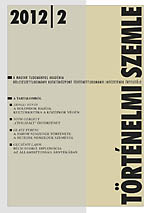A bolondok hajója. Kultúrkritika a középkor végén
The Ship of Fools. Cultural Criticism at the End of the Middle Ages
Author(s): István TringliSubject(s): History
Published by: Magyar Tudományos Akadémia Bölcsészettudományi Kutatóközpont Történettudományi Intézet
Summary/Abstract: Cultural criticism is not an invention of modern thinking, it is not the result of doubts over the new social and political order which had succeeded to the ancien regime. Cultural criticism is, in fact, a natural self-reflexion of culture itself. Medieval literary works contain regular remarks which are critical about both society and culture. The Ottoman menace and the invention of the press made additional impetus to late medieval cultural criticism, which frequently depicted the reigning order in ironical terms. The criticism of the present necessarily involved an idealisation of the past; it was thus that after the fall of Belgrade (1521) the reign of King Matthias I of Hungary (1458–1490) assumed an idealised nature in popular thinking, a view that infiltrated historical works as well after the fall of Buda (1541).
Journal: Történelmi Szemle
- Issue Year: 2012
- Issue No: 02
- Page Range: 175-185
- Page Count: 11
- Language: Hungarian

